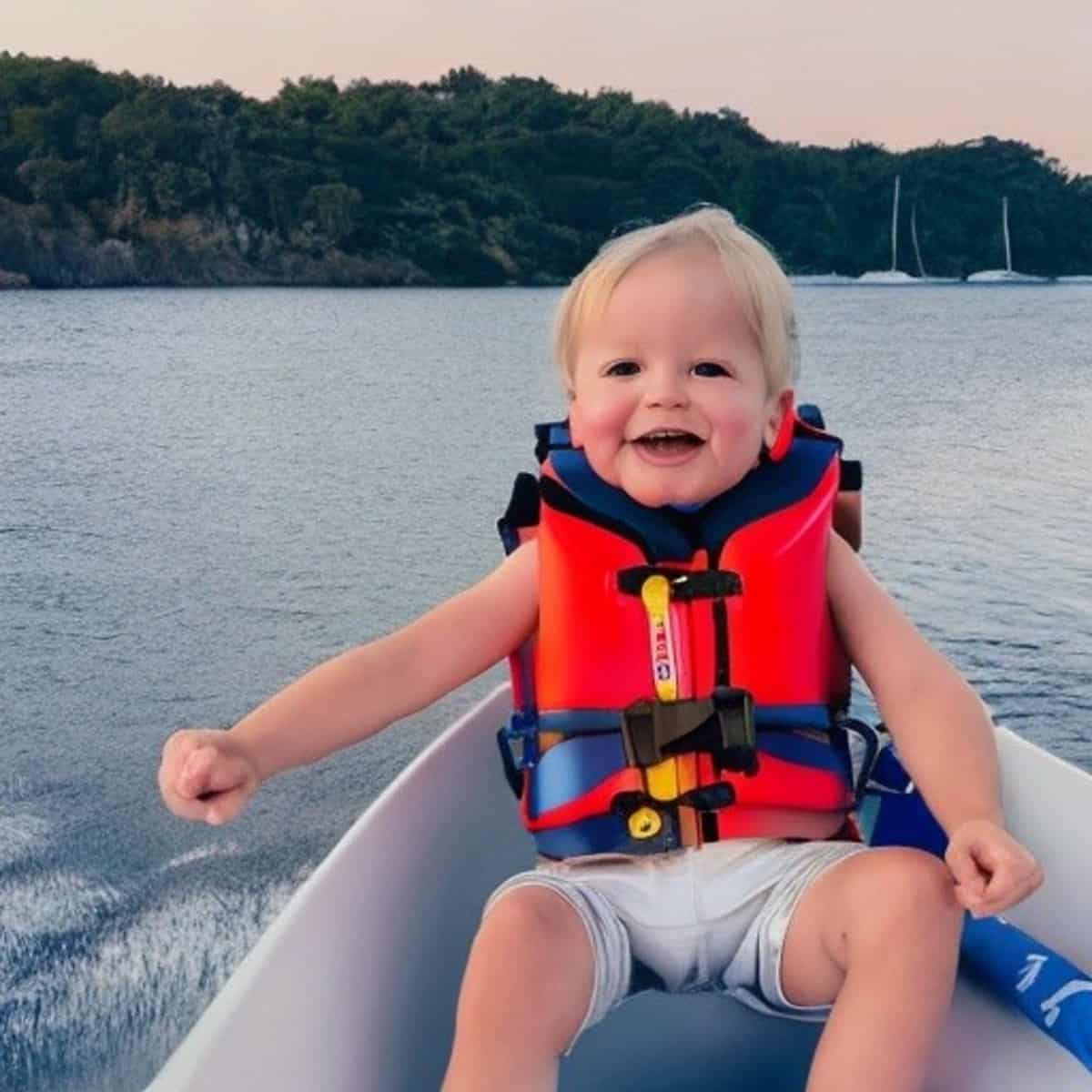Boating with toddlers can be a challenge. A knowledge of water safety is crucial to boat safe. Here are tips and tricks for keeping your trip sane and safe.

Boating with toddlers can be a challenge. Staying out on the boat all day can be exhausting for anyone, but toddlers seem to vocalize it a little more than their older siblings. Like with shrill screams, crying for long lengths of time, or incessant never ending whining.
Getting on the Boat With a Toddler
Did I tell you that for a week straight we heard "da butt, da butt" everyday, all day when we first brought home the boat (aka "da butt") home?
She sat in it, she helped clean it, she moved the steering wheel. We turned it on once in the driveway. It scared her, but she still loved the boat. We took the boat on the lake, and the first trip out she freaked out. The. Boat. Moved.
While usually a water crazed maniac, she became hesitant to jump in the lake and swim. She was paralyzed standing on the side of the boat. The boat tilted and didn't stay still. She didn't like that feeling. Once we coaxed her in the water we couldn't get her out. Soon the over tired hysterical toddler kicked in. We learned a lot this summer on what to do when you go boating with toddlers.
Water Safety
Pretty much plan on the safety of your toddler falling solely on you. They have to be accompanied at all times and must be within arms length of a responsible adult the entire trip. It can be exhausting to have eyes on them at all times. Safety for your toddler must come first. We have a one on boat one in the water rule. When our toddler is tired of being in the water, one of us stays in the water with the older kids while the other one stays on the boat with the toddler.
Life Jackets
One of our rules is life jackets go on all kids and adults before you get in the boat to launch it. Toddlers can resist wearing a life jacket at first, but soon learn that the buckles on their life jacket are fun to put on and try to take off. Just make sure that you use a Coast Guard Approved Flotation Device. Most will say it on the life jacket. Make sure the life jacket also fits properly. Most boating stores can show you how to fit the life jacket properly to your toddler.
Teach Toddlers Phrases
Teach little phrases to your toddler while you are out on the boat. They can help hold up the flag when a skiier goes down. Teach, "Uh oh, Skyler fell down, put the flag up."
You can also teach them not to lean over the sides, or teach them that they need to be sitting safely beside you on the seats when the boat is moving.
Sunscreen is also important when you head out for a day on the lake. Check your bottle for application recommendations and reapply as necessary.
Hydration and Food
Staying well hydrated is crucial to a good trip. Just because you are in the water doesn't mean you're staying hydrated. Bring along juice or water for your trip. Avoid sugary drinks and drinks with carbonation.
Snacks are also important. Since boating is like a mini vacation for our family, we aren't always the best at packing the most healthy of snacks. Cookies, chips or candy seem to sneak their way in. Toddlers don't do well with those kinds of foods long term and will make you pay for it with tears and tantrums. Try cutting up fresh fruit, bringing along some granola bars, or healthier fruit snacks. Protein snacks are also good energy for swimming. We love some chocolate trail mix and peanut butter and jelly trail mix.
Handling Naptime
If you have a great napper that will sleep anywhere, consider yourself lucky. For the rest of us, read on.
I can remember our first couple of times boating. The big kids wanted to stay out and the little one was whining because she was tired. When the whining stopped, it went to crying. Crying went to screaming. I can remember holding her in a blanket while she screamed while my husband drove the boat. As soon as the boat gliding over the waves began lulling her to sleep I would frantically tell him, "Don't stop! Keep the boat going another fifteen or twenty minutes! She's not good and asleep yet!" At that point, he would usually head back to shore.
Be Flexible
The first thing is be flexible. If you live somewhere where you can go on the lake for shorter periods of time, do it. Go in the morning before naptime, or in the late afternoon and early evening after naptime.
If you have a toddler you can adjust naptimes with, you can try that to in order to get a longer length of time on the water. Put them down an hour or two before their usual naptime to allow them to rest.
Depending on the size of your boat you may be able to bring a long a portable crib for them to lay down in.
Motion Sickness
Some toddlers can get motion sickness. Motion sickness in children is manifested by queasiness, a cold sweat, fatigue and loss of appetite. To help with motion sickness, feed your child a snack before going on the boat, point out stationary items ahead of you when you are out on the water, distract them (play hand games or have them help you with a task on the boat), or use medication (but as a last resort). Some state that the holistic motion sickness bands help children while others use over the counter medications. Just a Note: These medications are NOT recommended for children under age 2 and you should always consult with your doctor before giving your child any medication.
If they do get sick while you are out on the boat, put a cool washcloth on their head, have them lie down, and keep them hydrated by offering lot's of liquids.
Pack a Change of Clothes
One of the things toddlers love is to be comfortable. On the way back to shore I will change our toddler into a dry diaper and clean, warm clothes. The trip back to shore is much more enjoyable when she is dry than when she is in a cold bathing suit with the wind blowing on her, or in a wet diaper and wrapped up in a blanket. Pack along an extra outfit, a diaper or underwear to change into when swimming time is over.
Don't Feed the Fear
This is one that I've learned more and more about the further I've gotten in school. No matter how young a child is, they listen to you, they feed off your emotions, and they observe you.
Say your child has a bad first time experience like our toddler did. She was scared that the boat moved and she didn't want to go swimming. I hear so many parents talk to other parents about their bad experience and how they'll never take their kid back on the boat, into the swimming pool, or go back to do whatever the fear of the child may be.
Anyone being treated for an anxiety disorder is treated how--by facing the thing that is causing the anxiety. They are exposed to it in a controlled environment. Talking to your toddler before hand about what is going to happen, showing them other boaters and swimmers having fun while you are on the water, making a game out of boating, and calmly acknowledging their fears goes a long way to help them overcome their fears.
Boating is a great activity that is fun for the entire family. Boating with your toddler can be a great experience if you have all the right tools in place. Nothing can beat their excited enthusiasm as you race across the water, hold onto them on a tube behind the boat, or have them jump into your waiting arms as they jump from the boat to the water.
Related Articles:
Boating with a Baby by Boaters Life Online
Boating with Children by Discovery Boating






Fisher Tom
Well, some people do not even wear life jackets on their toddlers when they are on the boat. I think it is insane.
Maritime training school
Hello,
Greetings from Maritime Training School!
I felt like you are missing the most significant question to ask yourself and i.e When should your children wear a life jacket?
So, we would like to add some points to it.
• Children have often drowned when they were playing near water and not intending to go swimming. They can fall or glide into the water swiftly and silently without adults being aware. A lifejacket can help in keeping your kids safe until someone can rescue them.
• Your child could slip out of a life jacket that is too big or not buckled up properly so always make sure the lifejacket fits your child's weight.
Remember to stay near to them and always supervise your children at all times.
Thanks